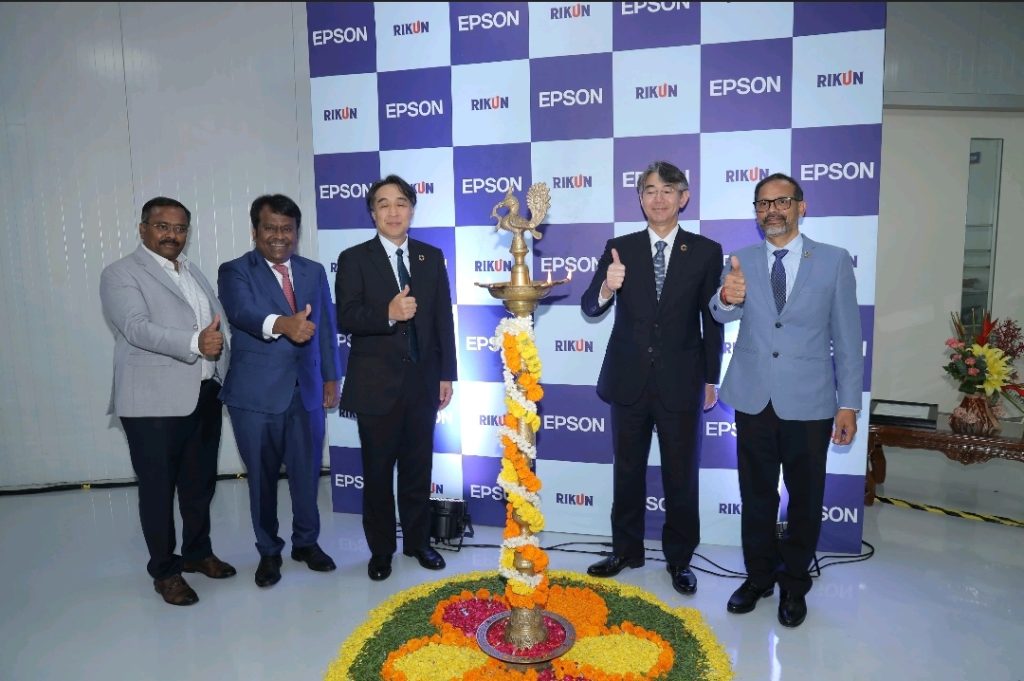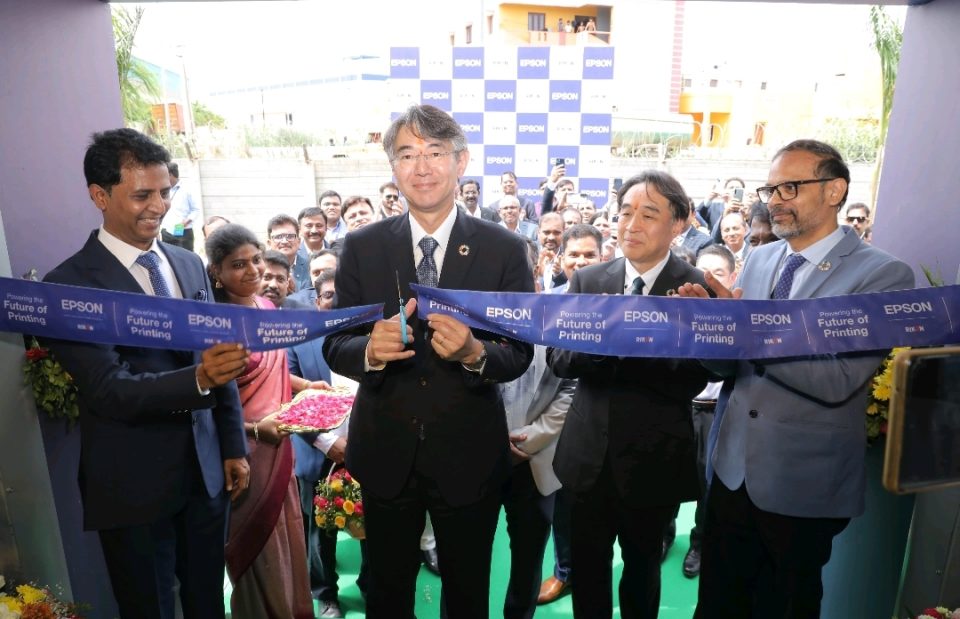Picture this: You’re running a small business in Mumbai. Moreover, your printer runs out of ink during a crucial client presentation. Furthermore, you desperately need a replacement cartridge. However, the local store doesn’t have it in stock. Additionally, online delivery takes three days. Consequently, your client relationship suffers. Sound familiar? Well, Epson just announced a game-changing solution that could transform this frustrating experience forever.
A Historic Milestone in Customer Experience
Recently, Seiko Epson Corporation inaugurated India’s first ink tank printer manufacturing facility in Chennai. Subsequently, this move represents more than just another factory opening. Instead, it signals a fundamental shift in how businesses approach customer experience in India.
“This is a historic occasion for Epson,” declared Mr. Junkichi Yoshida, Global President of Seiko Epson Corporation. Furthermore, his words carry significant weight for Indian businesses and consumers alike.
Why Local Manufacturing Matters for Your Business
Initially, you might wonder how manufacturing location affects your daily operations. However, the customer experience implications are profound. Specifically, local production delivers three critical advantages:
Faster Response Times Previously, spare parts and new units traveled thousands of miles from overseas factories. Now, however, Chennai-based production dramatically reduces delivery timelines. Consequently, your business downtime shrinks significantly.
Better Service Quality Additionally, local manufacturing enables faster problem resolution. Moreover, service technicians access parts more quickly. Therefore, your printer stays operational longer.
Cost Efficiency Furthermore, reduced shipping costs and import duties translate to better pricing. Subsequently, your business enjoys improved ROI on printing investments.
The EcoTank Revolution: Customer-Centric Innovation
Notably, the Chennai facility will focus on Epson’s flagship EcoTank printers. Meanwhile, these cartridge-free solutions have already transformed 8 million Indian businesses. Additionally, they contribute to over 100 million global EcoTank sales.
But here’s what makes this customer experience truly exceptional: EcoTank printers eliminate the traditional pain points of printing. Specifically, they offer:
- High-capacity ink tanks that reduce refill frequency
- Cost-effective printing that improves operational budgets
- Environmental sustainability that aligns with corporate responsibility goals
Strategic Alignment with India’s Digital Transformation
Importantly, this manufacturing initiative aligns perfectly with India’s ‘Make in India’ vision. Moreover, it demonstrates Epson’s commitment to local economic development. Subsequently, this creates a positive cycle that benefits all stakeholders.
As Mr. Samba Moorthy, President of Epson India, explained: “This new facility strengthens our ability to serve Indian consumers with greater agility.” Furthermore, this agility translates directly into superior customer experience.
The Customer Experience Analytics Behind the Decision
Now, let’s examine the strategic reasoning behind this significant investment. Evidently, Epson’s decision stems from comprehensive customer experience analysis.
Market Dynamics and Consumer Behavior
First, India’s economy continues expanding rapidly. Additionally, the country’s youthful population drives digital adoption. Consequently, printing demands increase across business segments. Therefore, local manufacturing becomes strategically imperative.
Supply Chain Optimization
Traditional supply chains created multiple customer pain points. Specifically, long lead times, inventory shortages, and service delays frustrated business users. However, local manufacturing addresses these systematic inefficiencies.
Competitive Advantage Through Customer Proximity
Furthermore, proximity to customers enables better understanding of local needs. Subsequently, product development becomes more customer-centric. Moreover, feedback loops accelerate innovation cycles.

Beyond Printing: Technology Leadership and Customer Experience
Significantly, Mr. Yoshida emphasized that “Epson is not just a printing company — we are a technology company.” This distinction matters crucially for customer experience strategy.
Precision Engineering Meets Customer Needs
Epson’s expertise in precision engineering, imaging, and robotics creates unique value propositions. Additionally, these capabilities enable innovative solutions that address complex customer challenges.
Sustainability as Customer Experience Differentiator
Moreover, modern businesses increasingly prioritize environmental responsibility. Consequently, Epson’s sustainability commitment resonates strongly with customer values. Furthermore, energy-efficient solutions reduce operational costs while supporting corporate sustainability goals.
Strategic Implications for Indian Businesses
This manufacturing investment creates several strategic advantages for Indian businesses:
Enhanced Service Ecosystem
Local manufacturing enables expanded service networks. Subsequently, businesses access faster technical support. Moreover, maintenance becomes more efficient and cost-effective.
Innovation Acceleration
Additionally, local presence facilitates rapid innovation cycles. Furthermore, customer feedback reaches development teams more quickly. Therefore, product improvements occur more frequently.
Economic Ecosystem Development
Furthermore, local manufacturing creates jobs and develops supplier networks. Subsequently, this strengthens the entire business ecosystem. Moreover, it enhances India’s technological capabilities.
The Customer Experience Framework
From an analytical perspective, Epson’s strategy exemplifies best practices in customer experience design:
Customer Journey Optimization
The company identified critical pain points in the customer journey. Subsequently, they designed solutions that address these specific challenges. Moreover, local manufacturing removes friction from multiple touchpoints.
Stakeholder Value Creation
Furthermore, the strategy creates value for multiple stakeholders simultaneously. Specifically, customers benefit from better service, employees gain local opportunities, and partners access new markets.
Sustainable Competitive Advantage
Additionally, this approach creates sustainable competitive advantages. Local manufacturing capabilities become difficult for competitors to replicate quickly. Moreover, established relationships with local suppliers strengthen market position.
Future Customer Experience Implications
Looking ahead, this manufacturing facility represents just the beginning of Epson’s customer experience transformation in India. Subsequently, we can expect continued innovation in service delivery, product development, and customer engagement.
As Mr. Yoshida concluded: “At Epson, we believe in the power of vision — not just to imagine a better future, but to build it with purpose, innovation, and responsibility.”
This vision-driven approach to customer experience will likely set new standards for technology companies operating in India. Moreover, it demonstrates how global corporations can successfully localize operations while maintaining international quality standards.
Ultimately, Epson’s Chennai facility inauguration marks a pivotal moment in India’s customer experience landscape. Furthermore, it proves that strategic manufacturing decisions can create lasting competitive advantages through superior customer service and operational efficiency.

